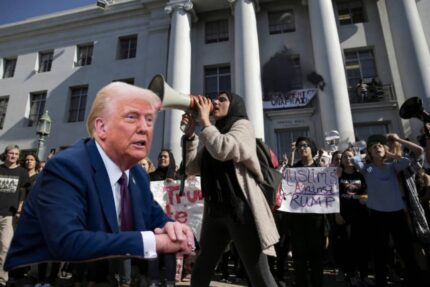Recent economic data reveals a significant decline in consumer sentiment, with many Americans expressing growing concerns over President Donald Trump’s economic policies. The University of Michigan’s preliminary February survey recorded a 5% drop in consumer confidence, marking the lowest level since July 2024.
This downward trend is fueled by fears of rising inflation, stock market volatility, and the economic impact of new tariff threats. Analysts point to Donald Trump’s rapidly implemented executive orders and policy shifts as key factors contributing to the uncertainty. Even among Republican voters who initially welcomed Donald Trump’s return to the White House, confidence in the economy appears to be eroding.
Tariffs, Inflation, and Market Volatility Raise Concerns
One of the most pressing concerns among voters and investors is the sudden shift in trade policies. President Donald Trump has reintroduced aggressive tariffs on several foreign goods, particularly from China and the European Union. These moves, aimed at protecting American industries, have instead sparked fears of retaliatory measures, potentially disrupting global supply chains.
Inflation expectations have also surged, with the University of Michigan survey showing a jump from 3.3% in January to 4.3% in February. This marks the second consecutive month of sharp increases, raising alarms about potential price instability. Many Americans are already adjusting their financial strategies, opting to invest in gold, real estate, or foreign currencies as hedges against economic turbulence.
Voters Blame Trump for Market ‘Chaos’
As financial markets experience increased volatility, some voters who supported Trump in 2024 are now expressing doubts about his handling of the economy. Paul Bisson, a 58-year-old Trump voter, told The Wall Street Journal, “I don’t like the turbulence. I don’t like the chaos in the market. That will make the economy worse, and that’s not what we signed up for.”
The Morning Consult’s index of consumer confidence also reported a decline between January 25 and February 3, further underscoring growing economic anxieties. Some investors worry that erratic policy decisions and escalating trade tensions could trigger a recession, a scenario that the Trump administration has downplayed.
Independent Voters Shifting Toward Donald Trump Despite Economic Worries
Despite economic concerns, some reports indicate that independent voters are increasingly siding with Trump, citing his stance on key issues such as illegal immigration, the cost of living, and gun rights. These voters argue that Vice President Kamala Harris, the Democratic nominee Trump narrowly defeated in 2024, has failed to present a compelling alternative.
Many independents remain skeptical of Democratic economic policies, even as frustration over market instability grows. This trend highlights the complexity of America’s partisan divide, where economic dissatisfaction coexists with a strong conservative preference on social issues.
Future Economic Stability in Question
The current state of the U.S. economy remains uncertain, with varying perspectives among different voter groups. While Trump loyalists continue to support his administration’s policies, financial analysts warn that prolonged market instability and inflationary pressures could have long-term consequences.
As Americans navigate this uncertain economic landscape, many are bracing for potential shifts in policy, global trade relations, and domestic economic strategies. Whether Trump can restore confidence in his economic leadership remains to be seen, but for now, the “Trump bump” appears to be fading fast.
A Nation on Edge
The early months of Donald Trump’s second term have been marked by economic turbulence and shifting voter sentiments. While consumer confidence is at its lowest level in months, reactions vary across the political spectrum. Some Americans are losing faith in Trump’s economic policies, while others—especially independents—continue to support him based on social and immigration issues.
As the year progresses, the administration’s handling of inflation, trade policies, and market stability will likely determine whether confidence can be restored or further eroded. For now, economic uncertainty remains a dominant concern for millions of Americans.














